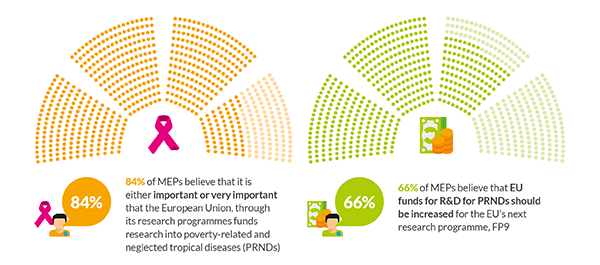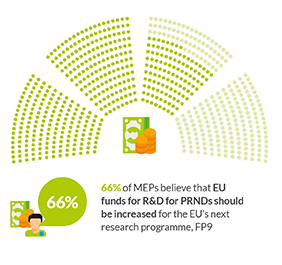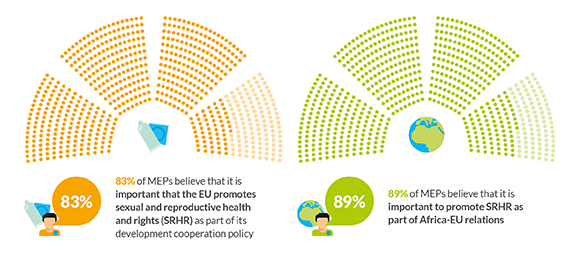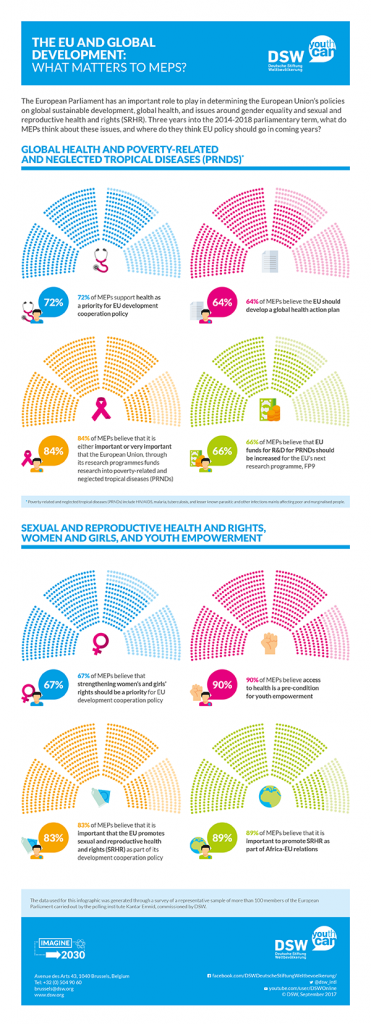DSW MEP Survey: MEPs support EU funding for disease research, reject Commission, Council threat of cuts
Brussels, September 7, 2017: In the results of a new survey released today, a two-thirds majority of the European Parliament believes that the EU is not spending enough money to fund research that is targeted at HIV & AIDS, Tuberculosis, Malaria, and other diseases of poverty that affect over one billion people worldwide, just as EU member states threaten to slash the EU’s annual budget allocation for this area.
In a poll of Members of the European Parliament (MEPs) on attitudes to the EU and its role in global development, conducted by Kantar Emnid and commissioned by international NGO Deutsche Stiftung Weltbevölkerung (DSW), 84% of MEPs think it is important to fund research into these disease and 66% of MEPs that they believe that EU R&D funding for diseases of poverty should be increased for the EU’s next research programme, known as FP9.
 DSW MEP Survey: Commission, Council threatening swingeing cuts
DSW MEP Survey: Commission, Council threatening swingeing cuts
DSW’s Cecile Vernant, Head of EU Office, said: “MEPs understand that without this vital R&D, we have no hope of eradicating these diseases by 2030 – something the EU has committed itself to. Unfortunately, this message has not gotten through to EU member states, or the European Commission, which are threatening to slash the EU’s 2018 budget allocation in this area. As we head into difficult budget negotiations, it is imperative that the European Parliament pushes back against these highly regressive budget cuts, and forces the EU to back its rhetoric on global health and sustainable development with financial support.”
In its budget proposals for 2018, the European Commission has proposed budget cuts of 10.11% to the Horizon 2020 budget line for “improving lifelong health and wellbeing“, from which the majority of funding for global health is located. In their response, the EU Council is proposing an additional swingeing cut of 12% on top of this. According to the most recently available data, the EU’s annual support for research funding totalled 125m USD, second behind the USA in global health R&D rankings.
 DSW MEP Survey: strong support for Sexual Health and Gender Equality in the European Parliament
DSW MEP Survey: strong support for Sexual Health and Gender Equality in the European Parliament
The DSW MEP survey also showed strong support among MEPs for EU action to prioritise the strengthening of women’s and girl’s rights (67% in favour), and that the EU promotes sexual and reproductive health and rights (SRHR) – issues like family planning, sexuality education, and maternal health – in its development policy (83% in favour). What it more, in light of the upcoming EU-Africa summit in Cote d’Ivoire in November 2017, 89% of MEPs believe that it is important to promote SRHR as part of EU-Africa relations. Additionally, the survey found that:
- 72% of MEPs support health as a priority for EU development cooperation policy
- 64% of MEPs believes the EU should develop a global health action plan
Download the full results of the DSW MEP Survey
DSW MEP Survey: Notes to the Editor
- Deutsche Stiftung Weltbevölkerung (DSW) focuses on the needs and potential of the largest youth generation in history. We are committed to creating demand for and access to health information, services and supplies, and to securing their right for a brighter future. We achieve this by engaging in gender sensitive advocacy, capacity development, and family planning initiatives. With our headquarters Germany, DSW maintains offices in Ethiopia, Kenya, Tanzania, and Uganda, as well as liaison offices in Berlin and Brussels. DSW also advocates for investment in research and innovation to fight poverty-related and neglected tropical diseases.
- Poverty-related and neglected diseases (PRNDs) are infectious diseases that disproportionately affect the world’s poorest populations. PRNDs include major diseases such as HIV&AIDS, tuberculosis (TB) and malaria, as well as a range of neglected tropical diseases (NTDs). In some definitions, the genotypes 4, 5 and 6 of hepatitis C and diarrheal diseases are also included. NTDs mostly comprise parasitic diseases such as hookworm, Chagas disease or schistosomiasis, but also viruses like dengue and chicungunya, and bacterial infections such as leprosy. An estimated 1 billion people are affected globally by PRNDs, causing the loss of 353 million years of healthy and productive life, and 6.5 million people die each year.
- Sexual and Reproductive Health and Rights (SRHR) covers four distinct but interlinked issues. Sexual Health includes healthy sexual development, equitable and responsible relationships and sexual fulfilment, freedom from illness, disease, disability, violence and other harmful practices related to sexuality. Sexual Rights are the rights of all people to decide freely and responsibly on all aspects of their sexuality, including protecting and promoting their sexual health, to be free from discrimination, coercion or violence in their sexual lives and in all sexual decisions, expect and demand equality, full consent, mutual respect and shared responsibility in sexual relationships. Reproductive Health is the complete physical, mental and social well-being in all matters related to the reproductive system including a satisfying and safe sex life, capacity to have children and freedom to decide if, when and how often to do so. Reproductive Rights are the rights of couples and individuals to decide freely and responsibly the number and spacing of their children, to have the information, education and means to do so, attain the highest standards of sexual and reproductive health and make decisions about reproduction free of discrimination, coercion and violence. (Based on the International Conference on Population and Development (ICPD) Programme of Action (UNFPA, 1995) and the Beijing Declaration and Platform for Action (UN, 1995)).

